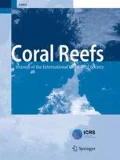Sharks, as apex predators, play a fundamental role in most coral reef ecosystems by influencing communities directly via predation or via behaviourally mediated trophic interactions (Heithaus et al. 2008). Healthy coral reefs are generally regulated by small sharks, such as grey reef sharks (Carcharhinus amblyrhynchos). Although small sharks have been found in the stomachs of the great hammerhead shark (Sphyrna mokarran) (Cliff 1995), direct observations of predation on free-living reef sharks are absent. Here, we report upon a great hammerhead shark preying on a grey reef shark at the World Heritage atoll of Fakarava (French Polynesia).
At sunset on 9 May 2011, a large female great hammerhead shark (~ 4.5–5 m TL) was observed to attack a school of approximately 100 grey reef sharks at a depth of 20–30 m in the pass ‘Garuae’. The hammerhead charged a grey reef shark (~ 1 m TL) from the deep. Its approach was very fast and deliberate. The predator then moved to the middle of the pass holding its prey motionless in its jaws (Fig. 1). The hammerhead disappeared slowly into the lagoon pursued by the entire school of grey reef sharks.
Schools of grey reef sharks have often been observed to be frightened by great hammerhead sharks and to pursue their assailant. Several hypotheses may explain the response of the other grey reef sharks: a collective mobbing as found in dolphins or seals (Kirwood and Dickie 2005) or simply an attempt to feed opportunistically on the carcass. Although sharks may not be a major component of the great hammerhead shark’s diet, this rare field observation confirms previous data from stomach contents, further documents this predator–prey interaction and highlights the complexity of the trophic food chain in healthy coral reef ecosystems.
References
Cliff G (1995) Sharks caught in the protective gill nets off Kwazulu-Natal, South Africa. 8. The great hammerhead shark (Sphyrna mokarran) (Ruppell). S Afr J Mar Sci 15:105–114
Heithaus MR, Frid A, Wirsing AJ, Worm B (2008) Predicting ecological consequences of marine top predator declines. Trends Ecol Evol 23:202–210
Kirwood R, Dickie J (2005) Mobbing of a great white shark (Carcharodon carcharias) by adult male Australian fur seals (Arctocephalus pusillus doriferus). Mar Mammal Sci 21:336–339
Acknowledgments
We are grateful to TOPDIVE, especially to Sébastien Jolivet, for their contribution to the description of the event. We are grateful to Ludovic Jego and Christian Hornecker for providing the photographs.
Author information
Authors and Affiliations
Corresponding author
Rights and permissions
About this article
Cite this article
Mourier, J., Planes, S. & Buray, N. Trophic interactions at the top of the coral reef food chain. Coral Reefs 32, 285 (2013). https://doi.org/10.1007/s00338-012-0976-y
Received:
Accepted:
Published:
Issue Date:
DOI: https://doi.org/10.1007/s00338-012-0976-y


